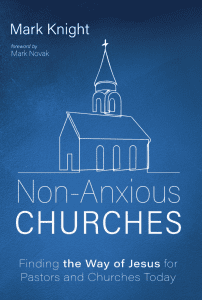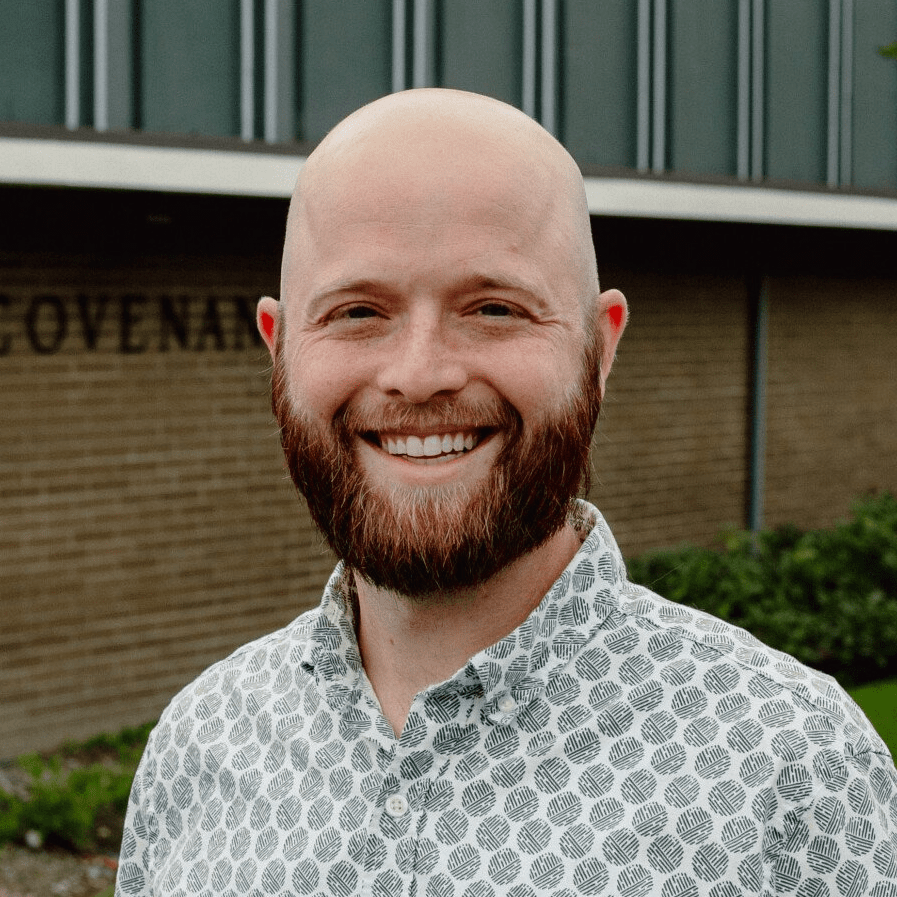A Conversation with Mark Knight, Covenant pastor and author of Non-Anxious Churches
In Non-Anxious Churches: Finding the Way of Jesus for Pastors and Churches Today (with a foreword from Covenant pastor Mark Novak), Mark Knight addresses our anxious approach to church. Knight, who serves as pastor of Praise Covenant Church in Tacoma, Washington, examines church systems and offers some best practices for healthy church leadership.
Recently Companion writer Jill Riley sat down over Zoom with Knight to talk about what a non-anxious church looks like. This conversation has been condensed and edited for clarity.
How did you come to write this book?
 I began writing devotionals for our church staff. I had been thinking about spiritual formation and how we as leaders can live non-anxiously. The book evolved from the fact that I am in my own process of learning and becoming a non-anxious person and pastor.
I began writing devotionals for our church staff. I had been thinking about spiritual formation and how we as leaders can live non-anxiously. The book evolved from the fact that I am in my own process of learning and becoming a non-anxious person and pastor.
As a culture, we’ve inherited some ancient, anxious systems. My goal is to offer a spiritual formation pathway to help churches abide in the presence of Christ as their primary source of identity. At the heart of it is Psalm 23 and the Lord being our shepherd. What does it look like for a church to live and breathe in that identity, especially when our culture is telling us to be bigger, better, faster?
How do you define an “anxious church”?
I try to avoid using the word “anxiety” because some people struggle or deal with chronic anxiety. That’s not what this book is about. It’s more about cultural anxiety. As a church, we feel anxious. As a body of believers, we feel anxious. But there are people and systems who work a ton and never burn out because they’re running with passion and they have healthy rhythms. It’s about where we feel strain versus passion.
I try to help readers understand that what Jesus identifies in Martha in Luke 10 is not to fault her service. He’s not saying, “Don’t be a servant.” Martha is living under this pressure to perform, whereas Mary is letting the presence of Jesus fuel the rest of what she does. Martha thinks about serving first, and if there’s time, she’ll sit at the feet of Jesus. I believe that’s not only how many of us function as leaders, it’s how many of our churches function. We serve first and abide if we have time. But of course, we never have time. So we just serve and serve. And because we aren’t living in the overflow of the Spirit, we become weary serving and we wonder why the kingdom of God doesn’t seem to be “working.”
What can a pastor or a church do to change that behavior?
There are two types of anxious churches. There are churches that are congregationally anxious. They chew up pastors and are a toxic system. And there are pastors who are toxic, and they begin to turn the church that way.
Being a non-anxious presence isn’t being lazy. It is finding our source from a different outlet. Instead of metrics, numbers, achievements, and all these barometers, our excellence should come from the overflow of a non-anxious life.
We’ve turned discipleship into a factory, instead of as a source of who we are. It has become “here’s how you produce Christians. And here’s how you do it at a fast rate. Here’s how you do it with as many baptisms as you can get.” We don’t see that in the same way in the church in other parts of the world, because they’re not living into the same cultural identity that pushes bigger, better, faster.
You write, “The hardest part of our westernized culture is that it has made ambition a virtue. We celebrate the great success of people, and we rationalize away the cost it took them to get there.” How do you see this concept playing out in the church?
A pastor told me once that he didn’t feel like he could retire because he never got his church up to 500 people. He had always heard that you weren’t a successful pastor until you had 500 people in your church, and he had bought into that lie. I get calls from pastors asking how to navigate being non-anxious in a way that brings about health when there might be people in the church who have brought their own unhealthy ideological systems to the situation.
We have to keep preaching the holistic gospel in lots of ways and discipling people along the way. We can’t jump from here to there in one leap. We keep moving the pulpit an inch at a time.
Who are some non-anxious leaders you admire?
I would say the late pastor and writers Eugene Peterson and Dallas Willard. Martin Luther King Jr. I read Tish Harrison Warren and James Bryan Smith.
How can a non-anxious church make a difference in our world?
Many have said that the millennial generation is one of the most anxious generations, but now it looks like Gen Z will actually surpass them. These days, everyone in the world is anxious. People have a desperate need to have a place where they can just be who they are without having to pretend. This is where the church can be a beautiful answer, a beautiful place of rest. We could provide spiritual disciplines, healthy rhythms, and places where people can be authentic.
I don’t think people are all that angry at church—I think it just feels like another thing that you do. If the church is going to be just another anxious system, why go? That’s not to downplay those who have been hurt or abused by the church, but a lot of people are leaving because it’s just another social club. Why would I take up my Sunday morning when I can experience the same level of pressure or stress somewhere else? Gen Z are leaving systems that don’t work for them.
Dallas Willard wrote that grace isn’t opposed to effort. It’s opposed to earning. I think what he was trying to get at is the idea that if you’re fueled by Jesus’s mission for the church, suddenly we look at things differently. We are fueled by grace, not earning. We have to find the ability to abide first and let the rest overflow.














